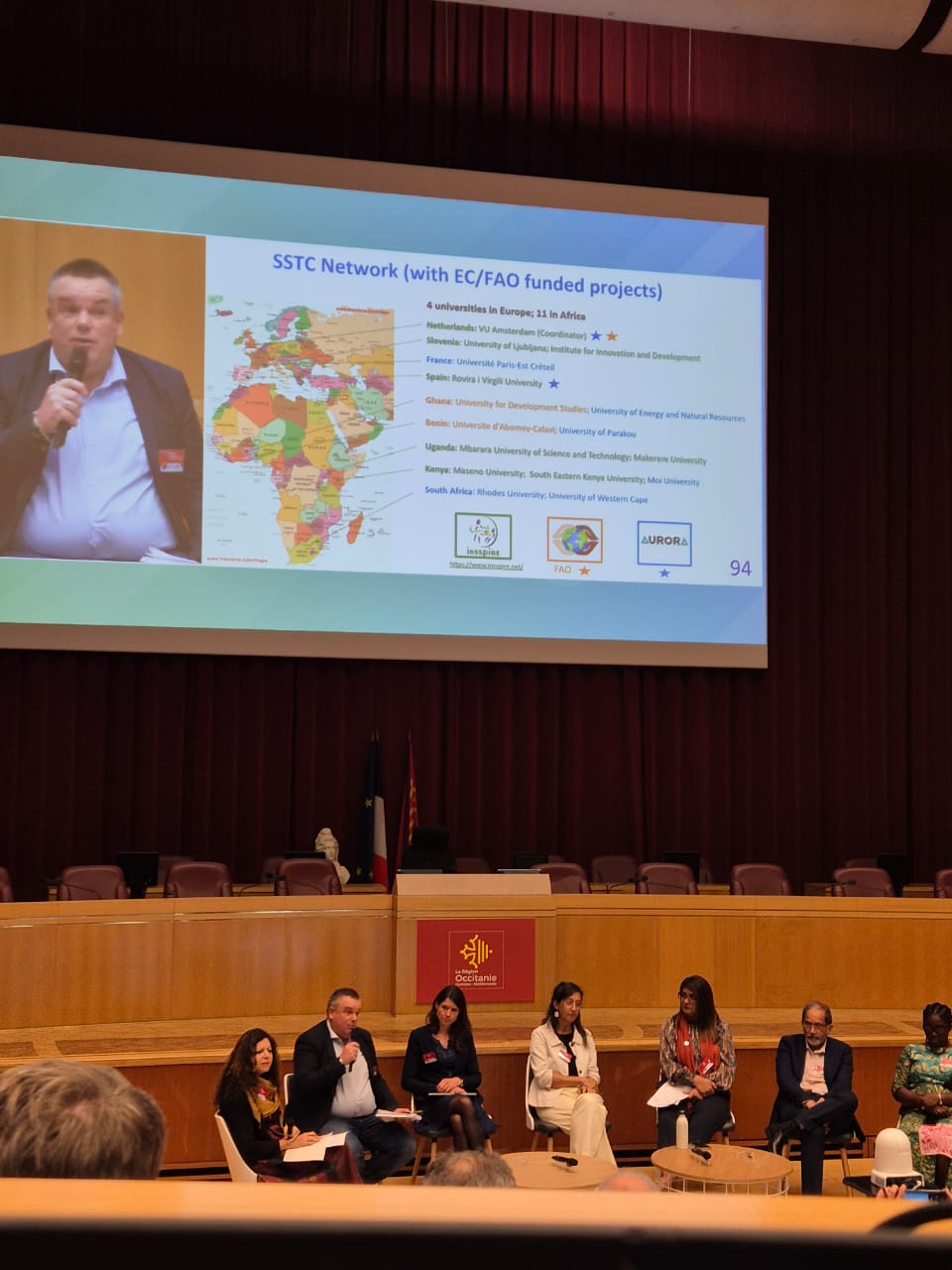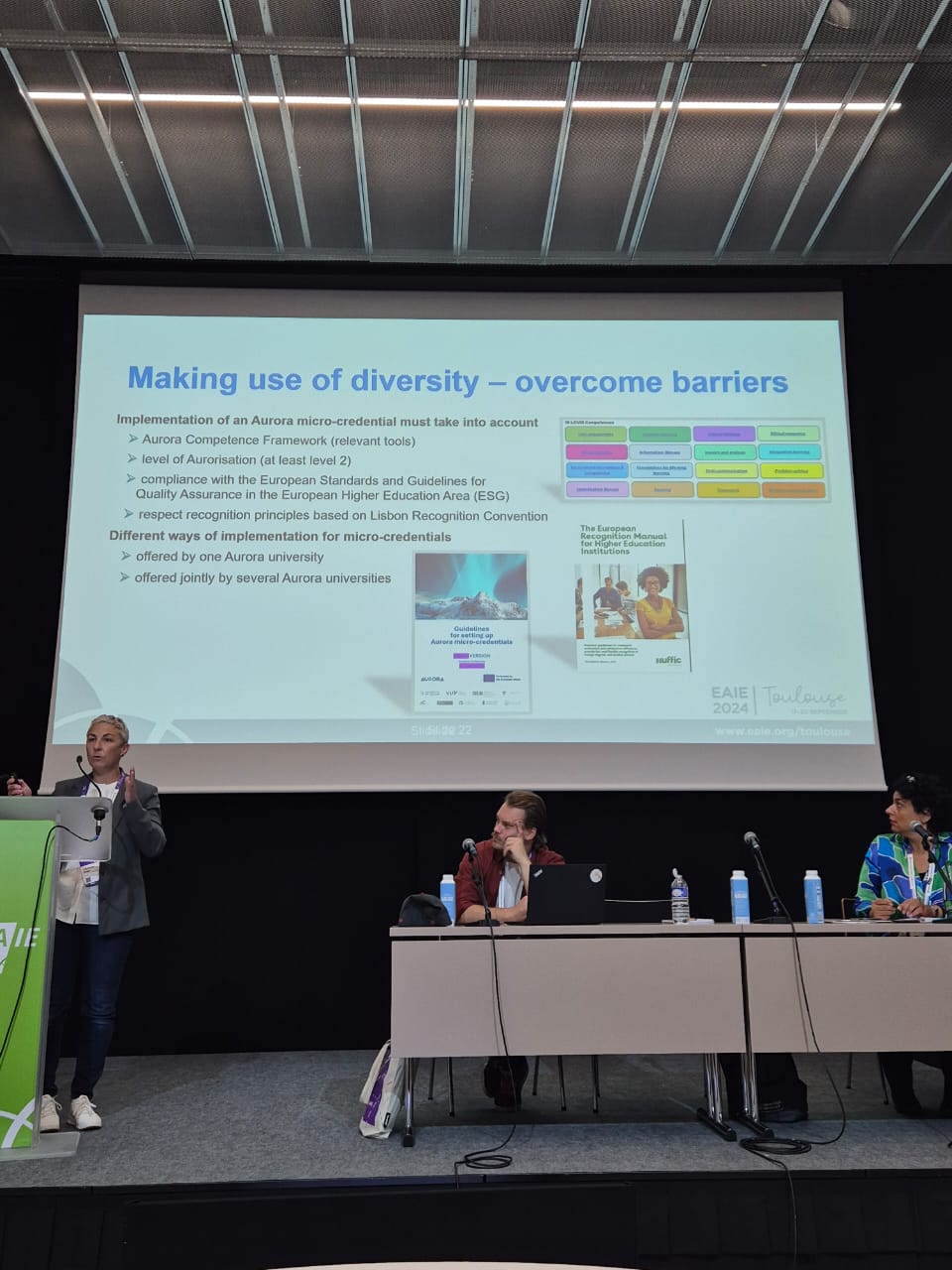
In the vibrant city of Toulouse, France, the 2024 EAIE (European Association of International Education) conference for higher education professionals spotlighted Aurora universities. From September 17 to 20, over 7,300 global participants gathered to enhance transnational educational cooperation.
The Aurora community contributed to three sessions, each addressing key themes in shaping higher education’s future: fostering mutual benefits through African partnerships, exploring global opportunities, and championing sustainability literacy across university alliances. This event reaffirmed Aurora’s commitment to innovation and collaboration in the global education landscape. The sessions included:
Partnerships with Africa: How to Unlock Mutual Benefits at the Internationalisation of European Universities Alliances: the new frontiers side event.

Hosted by the Université de Toulouse and la Région Occitanie, the Internationalisation of European Universities Alliances side event examined the reasons and methods by which European Universities alliances establish strategic partnerships with universities and stakeholders within and outside the European Union. Across the sessions, European universities’ alliances discussed their internationalisation strategies and approaches and presented case studies on how alliances can forge successful international connections.
The “Partnerships with Africa: How to Unlock Mutual Benefits” panel session, held on Tuesday, September 17, 2024, from 11:40 to 12:45, included Laurent Thevenet, the Vice-Rector for Internationalisation at Université Paris-Est Cretéil. Laurent Thevenet highlighted the need for structured exchange programs to enrich educational opportunities as African students often study in Europe individually. Equally vital is enhancing European students’ experiences in Africa, using initiatives like the real-life learning lab as a practical framework. Increasing intra-African mobility, currently limited, is crucial. Laurent stated, “We must work collaboratively to establish exchange programs and enhance cross-mobility both to and within Africa.”
The session, recorded for later viewing, further addressed challenges in forming partnerships between European and African universities, advocating for diversity and inclusion by engaging a geographically diverse set of African partners and embracing linguistic diversity. Building equitable partnerships requires moving beyond university rankings, focusing on existing collaborations, and supporting African initiatives through funding and research opportunities. Supporting African early career researchers through these partnerships is vital, enabling them to gain valuable experience and contribute positively to their home countries upon returning.
Unlocking Global Opportunities: Outreach Programmes at European University Alliances

On Wednesday, September 18, 2024, from 13:30 to 14:30, the session Unlocking Global Opportunities: Outreach Programmes at European University Alliances delved into the global dimension of European University Alliances. This session was organized by the chairs of ‘Non-EU partnerships’ ForEU2 working group and featured Selma Porobic, Aurora institutional coordinator at Palacký University Olomouc (UPOL), as well as speakers from EUNICE and UNITA.
Selma Porobic presented the results of a survey of 18 alliances on their geopolitical strategy for non-EU collaborations and inclusivity programmes for migrants and refugees. She highlighted the different approaches to non-EU partnerships as an important ambition of all the surveyed Alliances, with one-third of Alliances already pursuing non-EU partnerships. Selma shared noticeable trends in approaches: “The interest is mostly expressed towards US and Canada, and then Ukraine, and the Western Balkans countries. One major obstacle is, of course, ineligibility of EUIs funding for the associate partners and existing disconnection between the available EU funds to support these pioneering efforts.”
Selma also presented the existing support programmes for integration of migrants and refugees across the Alliances which demonstrated the key focus of these being on the efforts to integrate Ukrainian refugees. These were mostly supported by institutional funding, with only universities in Poland receiving targeted government support.
How European University Alliances are Spearheading Sustainability Literacy for All

Held on Friday, September 20, from 10:30 to 11:30, featuring Christina Raab, Jo Angouri from the University of Warwick (EUTOPIA), and Alexsi Vauhkonen from the University of Helsinki (Una Europa). They explored how European University Alliances tackle similar challenges in developing “Global Challenges” into innovative, scalable, and sustainable formats for students, researchers, and administration. This effort is crucial for a thriving European Higher Education and Research Area. Echoing Einstein’s wisdom, “We cannot solve our problems with the same thinking we used when we created them,” the session highlighted how these initiatives are successfully creating innovations in learning, teaching, and research, equipping students with essential skills and mindsets.
As the EAIE conference concluded, Aurora universities’ contributions left a lasting impact on the global higher education community. The discussions emphasized the transformative potential of educational landscapes, promoting mutual benefits and cross-border collaborations. The insights from this conference continue to inspire efforts towards an inclusive, sustainable, and interconnected academic future.